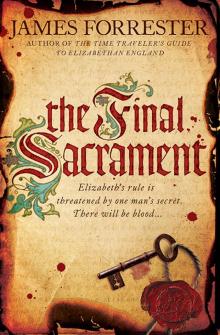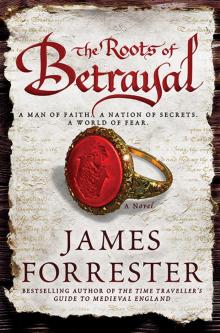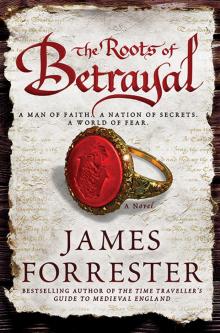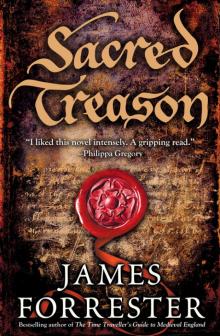- Home
- James Forrester
The Roots of Betrayal c-2
The Roots of Betrayal c-2 Read online
The Roots of Betrayal
( Clarenceux - 2 )
James Forrester
James Forrester
The Roots of Betrayal
Prologue
Ascension Day, Thursday, May 11, 1564
Everybody knew at least one story about Raw Carew. There was the matter of his birth: the illegitimate son of an English captain who abandoned his mistress to die in a Calais whorehouse. There was his refusal to surrender when Calais fell to the French in 1558. Although only seventeen, he had commandeered a ship and fought his way out of the harbor. Then there were the stories of his courage. Some of these were true, such as his boarding a Spanish vessel by jumping on to the rigging from the main mast of his ship in a heaving storm. Others were only loosely based on events or were fictitious. But even the tallest stories carried a modicum of truth. They were all wrought around an extraordinary man-brave as well as capable, regardless of whether the tale told was one of courage, seduction, loyalty, or revenge.
If William Gray, the captain of the Davy, had known that Raw Carew was at that moment in a skiff just two hundred feet away from his ship, he would have paid less attention to the young girl in his cabin and more to his crew, who were laughing, playing dice, and drinking by the dim light of the candles and lanterns on the main deck. Attack was the last thing on his mind. The ship was safe, anchored in Southampton Water, only four miles from the port itself. Gray knew that Sir Peter Carew was at that very moment patrolling the Channel with five ships and a royal warrant to hang pirates. The idea that Sir Peter’s own illegitimate nephew might take a vessel from its overnight mooring was unthinkable. Besides, Gray’s men had worked hard to sail so far that day. Leaving the Thames estuary five days earlier, they had been hit by a storm and had had to take shelter in Dover. It would not have been reasonable for Gray to insist that they stay on guard all night. The long hours in the rigging had been cold, and the wind coming up the Channel had delayed them. They deserved a rest.
***
Hugh Dean looked up at the black silhouette of the Davy. He had been the quartermaster on Raw Carew’s last ship, the ill-fated Nightingale, and retained his position as second-in-command. The smell of seaweed filled his nostrils as he crouched in the prow of the skiff. It was a new moon; the thinnest silver starlight touched the taut anchor chain and furled sails. He waited, listening to the lapping of the water and the slapping of the rigging in the brisk south-westerly wind. As the skiff came up to the Davy, he reached forward and placed his hands against the wet caulking of the hull, softening the impact. He whispered a single word-“Go!”-and the two men behind him hurled grappling irons over the starboard gunwales. They made sure they had caught, then started climbing the side of the boat. Two more men followed them. Three others could not wait and, having gained a handhold on an aperture or grabbed a piece of trailing rigging, they too pulled themselves up the wooden wall of the ship. Hugh Dean himself was one of these, determined to be at the front of any fray-the quartermaster’s proper station.
On the far side of the Davy, Raw Carew’s skiff also touched the ship. Up went the grappling irons and Carew began to climb, followed by his men.
The silence was broken by a shout. “Who’s there?”
Several men ran to the source of the noise, their feet thundering on the timber. A moment later, a throttled yell was heard as the sailor tried to call out again while a man cut his throat. A second guard, hearing the commotion, stamped hard, shouting, “Boarders! Boarders-on deck-” They were his last words. A sharp blade sliced through his gullet and sent a spurt of blood splashing onto the planking. A third guard did not even have the chance to cry out; a hand closed over his mouth and a dagger was forced through his back and into his lungs, once, twice, and then a third time. His killer felt the man’s weight crumple onto the deck. He threw the body against the gunwale and tipped it over the edge. It fell with a huge splash.
Only a handful of the fifty men below in the stinking dimness of the main deck heard the first shout. But all of them heard the stamping, the running, and the splash. Many hurried toward the ladder and climbed, only to find the hatch above them shut fast-locked from the outside.
They listened in fear. There was a second splash of a body into the sea, then a third. They could hear men striding across the deck above their heads. Hands fastened on the hilts of knives. Those with swords and daggers seized them and prepared for a fight. A ship’s lantern fastened to the base of the main mast flickered and went out, so that there was even less light. The boatswain of the Davy signaled for men to surround the ladder.
A full minute passed. Then they heard the creak as the heavy hatch was lifted.
Raw Carew stepped down slowly, into the candlelight. He was not tall. His only physically imposing feature was his upper body muscle, especially his powerful arms. He could climb a rope without having to touch it with his legs. His twenty-three years of hard living showed in his face, but they had not marred his good looks. His short blond hair stood on end, somewhat tousled. Smiling blue eyes darted between the men below deck, checking the shadows for possible lines of attack while preserving a confident expression. They were kind eyes: under their gaze each face unwittingly gave itself up for his examination. Four or five small golden earrings studded each ear. His velvet jerkin and linen shirt hung loose in an outlandish fashion. He wore a red scarf around his neck and several gold rings, including an enameled yellow one, with three black lions, on his middle finger.
The man nearest to the ladder challenged him with a blade, holding it up before his face. Carew raised an arm and gently pushed the blade to one side. The crew could see that he was carrying no weapon. His easy manner left them confused. A tall black man in his thirties, bald and bearded, with the furrowed brow of a general on the field of battle, followed him. His hand on a cutlass, with another blade in his belt, he looked around in the wick-lit darkness. The black-haired figure of the quartermaster Hugh Dean was next through the hatch, his leather jerkin and belt stuffed with three pistols. He also carried a pistol in each hand, and he pointed them at whatever caught his attention. His grinning eyes and the gun barrels flicked from man to man. His expression had all the relish of a huge bear that has just come across a pool of salmon.
The pirates came in a stream: the diminutive Stars Johnson, dreamy eyed, pale skinned, and armed with a dagger; the fat, bald figure of John Devenish, in a huge white shirt, flouncy blue breeches, carrying a curved Moorish blade. Then the next man and the next.
As Carew’s men assembled around him, he looked at the crew of the Davy. “Stay rested, all of you. We have no argument with you. But I will have words with-” There was a movement and a shout from a man nearby and a deafening explosion resounded through the vessel.
The noise subsided to a deep laugh. “Come on, more of you-come on!” Hugh Dean roared, shaking the still-smoking pistol in their faces. The smell of burnt gunpowder scorched the fug of the main deck. Only then did some of the crew see, in the dim light of the tallow candles, that the fallen sailor’s head had been blown clean away, leaving a raggedy stump, and blood splashed all over the beams.
“As I was saying, I wish to have words with the captain,” finished Carew, turning to the door beside him. More men came down through the hatch. He tried to unlatch the door; it was locked. “Hugh,” he said, placing a hand on the quartermaster’s shoulder. “If you please.”
Hugh Dean turned, aimed, and fired a second pistol into the lock. He kicked the door. It held good. He muttered a curse, but the tall black man who had followed Carew through the hatch launched his whole body at the timber, hitting it with his shoulder. The lock and the door gave way, and he stumbled into the cabin beyond.
Carew no
dded. “Thank you, Kahlu.”
He turned to the stunned mariners, bowed to them curtly, then went into the cabin, followed by three other men: John Devenish, a ginger-haired man called William “Skinner” Simpkins, and Luke Treleaven, a black-haired Cornishman of about twenty-five years, with brilliant green eyes. The others-eight of them now-stood ready, guarding the door and the ladder to the hatch. Stars Johnson took Hugh Dean’s first pistol and started to reload it, cleaning the inside of the barrel with a dampener and unfastening his powder flask. Dean took another out of his belt and swung it around, glaring at the crew in the shadows.
“I know what you’re thinking,” he began in a loud voice. “You’re thinking that you outnumber us. Let’s see, forty, forty-five…maybe there’s even more of you. And just a dozen or so of us. Well, that doesn’t include those still on deck.” He paused, looking from face to face. “Besides, if you try anything and force me to shoot you, you’ll miss Captain Carew’s speech. I’m sure you want to know what he is going to say. You do realize who our esteemed captain is? Most of you will be drinking with us before the night is through.”
In the captain’s cabin, Carew looked around, taking in the dimensions, the hiding places. It was about ten feet by twelve, with a small window shuttered against the night. There were three candles: one in a lantern on a hook by the cupboard bed, the other two on candlesticks projecting from the wall. There was a wooden berth on the left-hand side, a table on the right. The ceiling was low, so Kahlu had to cock his head to one side when he stood up straight; he leaned back against the wooden wall and rested his crossed arms on his chest.
Carew fixed his attention on William Gray. The captain was about forty years old with gray in his hair, dressed in loose breeches gathered at the knee and a white shirt covered by a red doublet. There were gold rings on three of his fingers.
Carew took the chair and beckoned to the captain. Gray hesitated but then moved forward. As he did so, there was a movement behind him and Carew saw the girl.
“Who is she?” he demanded.
“My niece,” replied Gray.
The girl’s smock was stained, her hair uncombed. Carew saw the fear in her eyes and her youth. She could not have been much older than twelve. He took a deep breath and gestured for the captain to be seated.
Gray’s eyes flicked to the door. “Sir, I have a commission from-”
“Be seated!”
Gray glanced between the pirates’ faces and sat.
Carew stood behind him, looking down on his head. He noted the gray hairs, the wiry-thin fair ones in the candlelight. It had started to recede. It made Carew despise the man’s possession of the girl even more. “Put your hands on the table. I want to see them. No tricks.”
Gray tentatively placed his fingers on the edge of the table.
“Flat, on the wood.”
Carew gave a signal to John Devenish and Luke Treleaven. They stepped around to Gray’s side of the table. Each took one of his arms. “Let go! Leave me!” shouted Gray. He started to struggle. Kahlu uncrossed his arms. Gray looked up, terrified and angry. “This ship is protected by the laws of England.” He tried to turn to face Carew as the men placed his hands on the table. There was a sudden movement, the thud of a knife entering timber, and Gray let out an agonized scream. Kahlu had brought the dagger down hard and driven it straight through the man’s right hand, pinning it to the wood. Instinctively Gray had tried to pull his bleeding hand away but his movement did nothing but drag the edge of the blade through his flesh. He screamed more, the pitch of his anguish rising with the waves of pain. “Jesus Almighty! Christ curse you and kill you!” Then there came another scream-a high-pitched inarticulate one-from the girl, as she realized what had happened. Immediately she tried to stop herself and her body began shaking, her eyes distraught with the image. Captain Gray was gasping, crying, and swaying. “Damn your bleeding eyes! The devil spit on your godforsaken soul.”
Carew turned around to look at the girl. Her face was dirty, her nails broken. “This man says you are his niece. Are you?”
“N-n-no, sir,” she cried, shivering. The terror showed in her eyes. “No, no! This man…he said he would take me home. My mother took me to the market in Dover and…and I was lost and went to the quayside, and this man…he said…he told me…he said he knows my father.”
Carew walked forward and touched her cheek. He held her face for a moment, looking into her eyes. Then he ran his hand down over her childish breasts, smoothing the cloth over each one with his thumb. “Did he touch you? Did he force himself on you?”
The girl looked at the captain, trying to speak. No words came out. She burst into tears.
Carew turned to the captain, whose cries had given way to grimaces and gasps of pain. He walked up close behind him and crouched down behind his right ear. “If I did not have an important question to ask you, you would be dead already. I would have thrown you overboard-in pieces. I would have had you tied between two planks and sawn up alive, starting with your feet. I have very few principles. In fact, just four. One: men should obey orders. Two: they should be honest. Three: they should throw their religion over the side of the first ship they sail in. And four: they should protect their companions, especially those who are vulnerable, like women and children.” He looked at the man’s neck, which was twitching. “But I did not come here for your moral instruction. You know what I want. The Catholic Treasure.”
Gray shook his head, tears running down his face as he fought the pain in his hand. He said nothing.
“Put his other hand out,” Carew said to Luke.
“No!” gasped Gray. “No.” He saw the faces of the other men and searched them for a sign of compassion. All he saw were curled lips, toothless smiles, and mild amusement. “Please, in God’s name, have mercy! Have a thought for your eternal souls, have pity!”
Skinner Simpkins pushed in front of Luke, grabbed the captain’s fist and held it on the table. Gray fought to keep his fingers tight together but Skinner simply drew his cutlass and smashed the hilt into the captain’s forehead, jolting his head back and causing a gash to open up just above his left eye. Then he brought the metal hilt down hard repeatedly on the captain’s knuckles, causing him to yell out and wrench his right hand against the pinning blade. Having broken two or three of the captain’s fingers, Skinner was able to splay the man’s hand.
“There is no treasure on this boat,” screamed Gray. “None. Look-look anywhere, everywhere! Look for yourselves!”
“Skinner, wait,” said Carew. “No treasure, you say?”
Gray bit his lip, weeping. Skinner waited. He turned the dagger in his hand, ready to pin the flesh to the table.
Carew inspected the wainscoting, the shuttered window. A basket of bread and cold meat stood on a rimmed shelf. There was indeed no sign of wealth in here. Apart from the space under the berth, the only other place where treasure might be kept was the chest. He pointed. “Luke, open it.”
Luke stepped around the table and lifted the lid. He tipped the chest forward: clothes and linen tumbled out, along with a Bible, a rosary, a small box, a cutlass, a pistol, a powder flask, some fine cotton kerchiefs, a comb, a purse, some documents, three pewter plates, two pewter cups, and a flagon. He then opened the small box and let the contents fall on to the floor: two rings, a few gaming pieces, dice, quills, and a small inkpot made of horn. The top came off the inkpot and the ink started to spread across the linen.
Carew turned back to Gray. “Where is the treasure?”
Gray remained motionless, in too much pain to react. His jaw started to move before any sound came out. “I…I do not know…I have not…heard of-”
“You must know! Why are you here? Who sent you?”
“I brought the woman-and the man.”
“What woman? What man?”
“Rebecca Machyn was her name. The man was Robert-Robert Lowe, I think. I…I was paid…to bring them to Southampton.”
“How much?”
&nb
sp; “Two h-h-hundred…pounds,” stuttered Gray, shivering. “One hundred and fifty…in advance. It is under the bed.”
Carew looked at Kahlu and glanced through the door. Hugh Dean was still guarding the crew.
Kahlu went to the bed, reached beneath it, and pulled out a second small chest. He opened it, showing the contents to Carew. The bottom was covered with gold coins.
Carew grabbed the captain’s hair and gestured to his broken left hand. “Skinner!”
A moment later, although the captain lifted his arm and tried to clench his broken hand, his fingers barely moved. Skinner Simpkins placed it flat on the table and drove his dagger through it with a thud, causing a trickle of blood to run quickly across the wood. Gray screamed again. Another scream lifted his body from the seat and tore his hands further. As the first screams subsided, more surged in him. Carew waited, still holding the man’s hair. When Gray’s cries had turned to sobbing and gasping, Carew started to pull the man’s head back, drawing the knives’ blades into the flesh of his hands.
“No one is running to your aid,” he said, looking at the door. “None of your crew. Perhaps it is because you are a bad captain? Perhaps because you keep your door locked, like a coward, when intruders board your ship? Perhaps because you abduct defenseless girls? What were you going to do with her? Take her home so she could inform the authorities what you did-or throw her overboard in the middle of the Channel? I know your sort.” He let go of the man’s hair.
Gray, with his bloody hands splayed out in front of him, lurched forward. He put his head on the table, trembling with shock.
“Where is the treasure?” said Carew.
“I do not know,” sobbed Gray. “I do not know what…you are talking about.”
“What was your mission?”
“To deliver…the man and the woman.”
“Who paid you?”
“A man called Percy-Percy Roy.”

 The Final Sacrament
The Final Sacrament The Roots of Betrayal
The Roots of Betrayal The Roots of Betrayal c-2
The Roots of Betrayal c-2 Sacred Treason
Sacred Treason